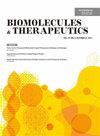奎宁酸通过减少 LPS 处理小鼠的神经炎症和 MAPK 激活来缓解行为障碍
IF 3
3区 医学
Q2 PHARMACOLOGY & PHARMACY
引用次数: 0
摘要
与其他器官相比,大脑的抗氧化防御能力有限。尤其是海马区是学习和记忆的中心区域,极易受到氧化应激的影响。神经胶质细胞是大脑中数量最多的细胞,神经胶质细胞的持续活化对神经炎症至关重要,而神经炎症会加重神经病理学和神经毒性。因此,调节神经胶质细胞的活化是一种很有前景的神经治疗方法。奎宁酸及其衍生物具有抗氧化和抗炎特性。尽管之前的研究已经证明了奎宁酸对大脑的益处,但对其在神经胶质细胞中的抗氧化和抗炎特性的体内和体外分析尚未建立。本研究调查了奎宁酸对脂多糖(LPS)诱导的行为障碍的挽救作用。口服奎宁酸可恢复社交障碍和LPS诱导的空间记忆和恐惧记忆。此外,奎尼酸还能抑制LPS注射海马中的促炎介质、氧化应激标记物和丝裂原活化蛋白激酶(MAPK)的激活。奎宁酸抑制了亚硝酸盐的释放和 LPS 刺激的星形胶质细胞中细胞外信号调节激酶(ERK)的磷酸化。总之,奎宁酸通过调节星形胶质细胞中的促炎介质和ERK活化,恢复了受损的神经炎症诱导行为,显示了奎宁酸作为神经炎症诱导的脑疾病治疗剂的潜力。本文章由计算机程序翻译,如有差异,请以英文原文为准。
Quinic Acid Alleviates Behavior Impairment by Reducing Neuroinflammation and MAPK Activation in LPS-Treated Mice.
Compared to other organs, the brain has limited antioxidant defenses. In particular, the hippocampus is the central region for learning and memory and is highly susceptible to oxidative stress. Glial cells are the most abundant cells in the brain, and sustained glial cell activation is critical to the neuroinflammation that aggravates neuropathology and neurotoxicity. Therefore, regulating glial cell activation is a promising neurotherapeutic treatment. Quinic acid and its derivatives possess anti-oxidant and anti-inflammatory properties. Although previous studies have evidenced quinic acid's benefit on the brain, in vivo and in vitro analyses of its anti-oxidant and anti-inflammatory properties in glial cells have yet to be established. This study investigated quinic acid's rescue effect in lipopolysaccharide (LPS)-induced behavior impairment. Orally administering quinic acid restored social impairment and LPS-induced spatial and fear memory. In addition, quinic acid inhibited proinflammatory mediator, oxidative stress marker, and mitogen-activated protein kinase (MAPK) activation in the LPS-injected hippocampus. Quinic acid inhibited nitrite release and extracellular signal-regulated kinase (ERK) phosphorylation in LPS-stimulated astrocytes. Collectively, quinic acid restored impaired neuroinflammation-induced behavior by regulating proinflammatory mediator and ERK activation in astrocytes, demonstrating its potential as a therapeutic agent for neuroinflammation-induced brain disease treatments.
求助全文
通过发布文献求助,成功后即可免费获取论文全文。
去求助
来源期刊
CiteScore
6.60
自引率
8.10%
发文量
72
审稿时长
6-12 weeks
期刊介绍:
Biomolecules & Therapeutics (Biomolecules & Therapeutics) (Print ISSN 1976-9148, Online ISSN 2005-4483) is an international, peer-reviewed, open access journal that covers pharmacological and toxicological fields related to bioactive molecules and therapeutics. It was launched in 1993 as "The Journal of Applied Pharmacology (ISSN 1225-6110)", and renamed "Biomolecules & Therapeutics" (Biomol Ther: abbreviated form) in 2008 (Volume 16, No. 1). It is published bimonthly in January, March, May, July, September and November. All manuscripts should be creative, informative, and contribute to the development of new drugs. Articles in the following categories are published: review articles and research articles.

 求助内容:
求助内容: 应助结果提醒方式:
应助结果提醒方式:


